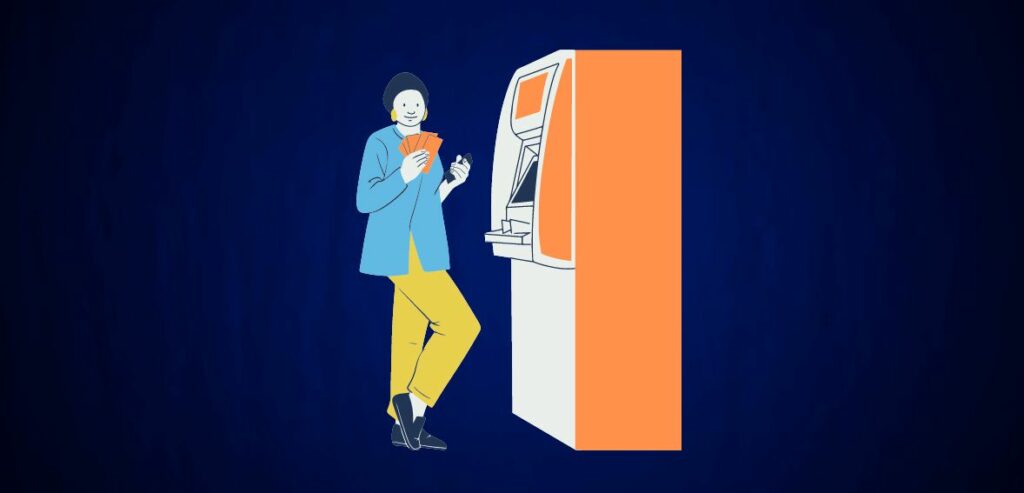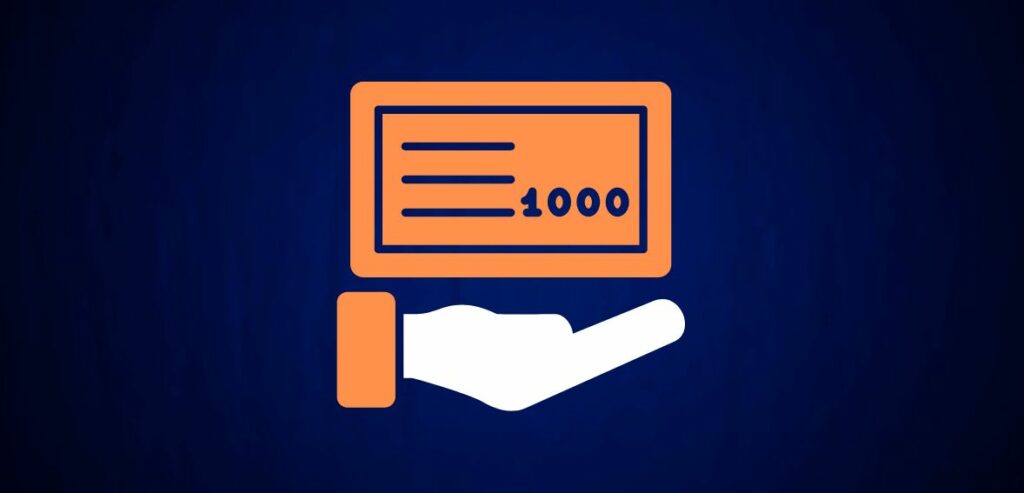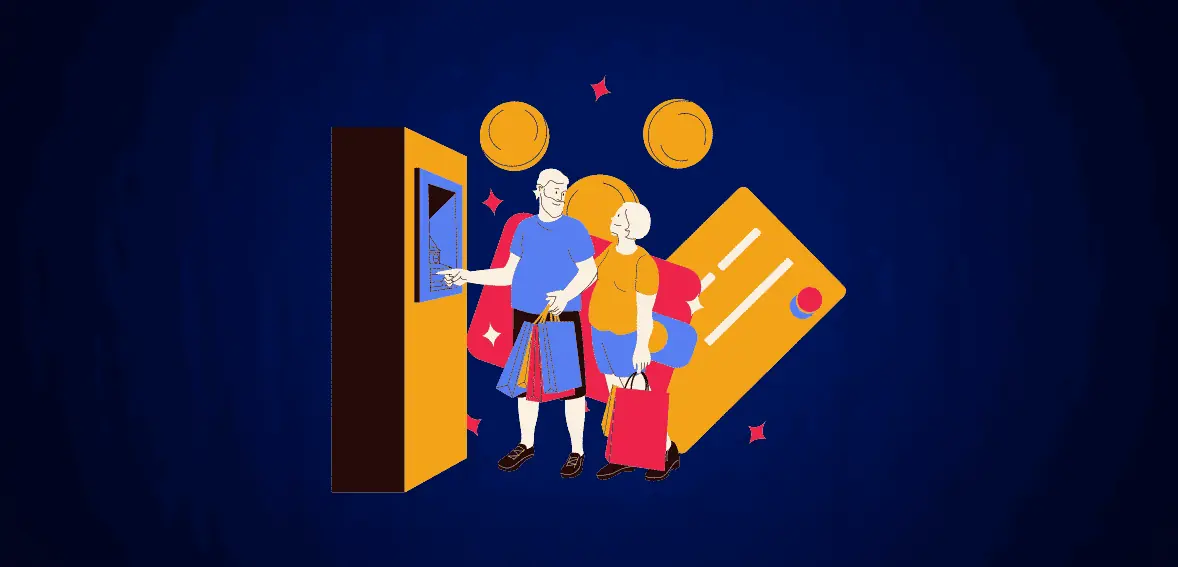In an era where digital transactions dominate, receiving a paper check can be inconvenient. If you receive a check, you have limited options to cash it quickly. Banks and credit unions can cash the check during business hours. However, cashing the check via ATM is another convenient alternative available after bank hours. But can you cash a check at an atm?
The answer is yes. When you cannot visit a bank, you have an easy option with ATMs. ATMs present a viable option to cash a check after banking hours.
The Basics of Cashing a Check
If you urgently need to cash a check, an ATM provides a convenient alternative. Although the process may be slightly more complex, it’s worthwhile. But before we move forward, we must know that not all ATMs provide this service. Remember, while cashing a check at an ATM, the check is typically deposited into your checking account before you can withdraw cash.
Step-by-Step Process to Cash a Check at an ATM

Check if your bank has the facility.
Begin by verifying whether your bank’s ATM provides check cashing services. While some ATMs from other banks may offer this feature, opting for your own bank’s ATM is preferable to avoid extra charges and potential delays in fund availability. However, it’s essential to note that not all ATMs are equipped for this purpose, even within your bank’s network. Before proceeding, confirm that the ATM accepts your bank card type and facilitates check deposits. Certain smaller ATMs, commonly located in convenience stores, may solely dispense cash and do not have a check deposit slot.
Arriving prepared at the ATM is crucial for a smooth transaction. Ensure you have the following items:
- Bank debit card: Most ATMs require your card for deposits. Bring it along, ensuring it’s activated beforehand.
- Personal identification number: Memorize your PIN for secure access to your account.
- Your check: Ensure the check is made out to you or a listed account holder and is appropriately endorsed.
- Deposit envelope: Some ATMs may need you to use a bank-provided envelope for check or cash deposits. Check the ATM for instructions and availability of envelopes.
Before proceeding with any ATM transaction, prioritize your safety by ensuring your surroundings are well-lit and secure. Opt for machines in high-traffic areas or frequently visited places, as the additional foot traffic and surveillance can enhance security. Keep your cash concealed from view and guard your PIN carefully to prevent unauthorized access. These precautions help safeguard your personal and financial information during ATM transactions.
Step-by-step guide to cash the check at an ATM:
To cash your check at an ATM, follow these steps, although the exact process may vary depending on the ATM:
- Insert the card: Insert a valid active card in the machine. Check the screen for instructions.
- Enter PIN: Please enter your PIN securely. Be cautious and ensure that your PIN remains confidential. Do not allow others to see the PIN you are entering.
- Select the type of transaction: After entering your PIN, the ATM will prompt you to select your desired transaction. You may be prompted with options like “Deposit” and “Get Cash Back.”
- Select your account type: You usually get the “checking” or “saving” account options. Select which account you are using.
- Enter the amount: While some ATMs automatically read the check amount upon insertion, others may require you to enter the amount manually. Follow the prompts accordingly to complete the withdrawal process.
- Insert the Check: Ensure you’ve endorsed the back of your check, then insert it into the ATM deposit slot. Some machines may require an envelope, while newer models typically do not. Check the screen for specific instructions. If you have multiple checks to deposit, ensure your ATM can handle them simultaneously.
- Verify Amount: Confirm that the dollar amount displayed on the screen matches the amount on your check.
- Finalize Transaction: Answer any remaining prompts on the screen, retrieve your receipt, and ensure you have your bank card before leaving the ATM.
For customers eligible for same-day deposits, there are no extra fees. However, depending on the bank’s ATM and account type, the time for the availability of funds may vary. In some cases, funds may not be accessible until the second business day after the deposit. Additionally, if utilizing an out-of-network ATM, customers may face additional ATM transaction fees, and it could take up to five business days for the deposited funds to reflect in their account.
Different Types of Checks Acceptable at the ATMs

Different types of checks, such as cashier’s, personal, and certified checks, are used to transfer funds. Here are the most common types of checks typically accepted by ATMs:
- Cashier’s Check: A cashier’s check is compatible with ATMs, backed by a bank’s funds, and signed by a cashier. To ensure a smooth transaction, it’s advisable to use an ATM associated with the bank that issued the cashier’s check.
- Personal Checks: ATMs generally accept personal checks.
- Certified Checks: Certified checks, similar to cashier’s checks, are issued by the bank but signed by the account holder instead of a cashier. They can typically be deposited at an ATM using your debit card.
- Pre-printed Checks: Most pre-printed checks can be deposited and withdrawn at an ATM, provided your bank permits. Government-issued checks, such as tax refunds, are usually the easiest for banks to verify, often resulting in immediate access to funds. However, foreign-issued checks may require a longer processing time.
Will You Get Instant Access to the Funds?
As mentioned above, it varies depending on the type of deposit. Some eligible customers may get instant cash after depositing a check, while other check deposits typically follow a schedule determined by individual banks. Generally, these check deposits can be withdrawn in two to three days.
It’s important to note that banks and credit unions have specific cut-off times for processing deposits, which can vary. For instance, some institutions consider noon the end of the business day for ATM transactions. Deposits made after these cut-off times may be processed the following business day.
Additionally, depositing at an ATM owned by a bank different from yours can also affect the processing time. In such cases, there may be delays in accessing your funds.
Can You Cash a Check at any Bank?
If you’re wondering whether you can cash a check at any bank, the general rule is that most banks won’t cash checks for non-customers. However, you can cash a check at the account holder’s bank who wrote the check.
Remember that there might be a small fee associated with this service. The most straightforward option for cashing a check is at a bank where you hold an account, whether a checking or savings account.
Where Else Can You Cash a Check?
If you’re unable to cash your check at an ATM, then there are other methods available which are listed below.
- Bank branches: Visit your bank’s branch and cash your check with a teller. This method is reliable, especially for large amounts.
- Retail stores: Many supermarkets, department stores, and specialized businesses offer check-cashing services, often for a fee. Walmart, for instance, is known for cashing various types of checks.
- Mobile check deposit: If your bank provides mobile banking services, you can use their app to deposit your check digitally. Once the check clears, you can conveniently access the funds.
- Post office: Some postal offices provide check-cashing services in certain regions.
What ATMs and C-Stores Allow Check Cashing?
Some of the bank ATMs and convenience stores that facilitate check cashing or depositing include:
- Bank of America
- JPMorgan Chase
- Wells Fargo
- TCF Bank
- Citigroup
- US Bank
Additionally, various grocery stores and retailers provide check cashing services for a fee, including:
- Walmart
- Kroger
- Jewel Osco
- Food Lion
- Check Cashing Stores
- Publix
Conclusion
ATMs serve as convenient alternatives for cashing checks, offering flexibility and accessibility beyond traditional banking hours. While not all ATMs provide check-cashing services, those that streamline the process allow individuals to deposit checks directly into their accounts. Understanding the steps involved, including card usage, endorsement requirements, and account verification, ensures a smooth transaction.
However, it’s crucial to note that ATM check deposits may have processing times, affecting fund availability. Additionally, alternative options such as mobile deposits, bank branches, retail stores, and check-cashing services provide additional avenues for accessing funds when ATMs are unavailable or less convenient.
Frequently Asked Questions
Can I cash checks at ATMs?
You can cash your check at an ATM if it's within your bank's network. However, reviewing your bank's policies, including any daily withdrawal limits, is advisable before proceeding.
Can you cash a check at an ATM without a bank account?
Some banks allow check cashing at ATMs if the funds are loaded onto a prepaid card account. This method offers convenience and avoids long lines at banks or stores.
How do ATMs verify checks?
ATMs verify checks by scanning them to ensure proper endorsement and the presence of essential information like account and routing numbers. Additionally, the ATM captures images of both sides of the check using a scanner or camera.
Can ATMs detect fake checks?
ATMs can detect counterfeit or fraudulent checks by examining security features such as watermarks, threads, and microprinting. If a check is deemed fake, the ATM will reject it and notify the user accordingly.
Q:
Q: H
Q:

